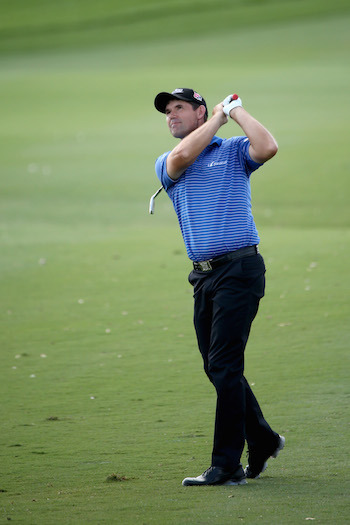The Irish reputation for loquacity is well-founded. Even when Padraig Harrington produced one of his less tortured rounds, a 63 in Phoenix two years back, his answer to a prosaic inquiry about his swing was 1,850 words long. It was almost baroque in its prolixity, encompassing everything from the interviews of Arnold Palmer to his visions of how good a golfer he might be at age 70. To listen to this sweetly tormented soul is to understand how James Joyce, Harrington’s fellow Dubliner, sat down one day to compose Ulysses and wound up stretching a day in the life of an advertising agent out over 1,000 pages.
Harrington is a psychology manual in human form, a man whose manic eyes on the course betray the thousands of hours he has spent absorbing the shrink-speak of “mind coach” Bob Rotella. If he did not have wife Caroline and his two children, dear Padraig would, he once admitted during an hour-long interview in which I asked no more than five questions, be a “basket case.” The length of time he could force himself not to think about golf would extend no longer than a single episode of CSI. “And even then, if there was an ad break, I’d struggle not to get up and swing a club.”
Harrington has been known to practise in bare feet, in the dark, to refine his backswing with the aid of an inflatable sausage, to hit balls for four hours straight in the sopping humidity of Malaysia as a group of Americans nearby wondered aloud what the mad Irishman was doing. Golf is intrinsically conducive to such obsessive thinking. It is an old aphorism that one can see a man’s true character after just five or six holes on the course, that every extreme of charity and malevolence can be manifested within a full 18. Therein lies our ambivalent attitude towards its maddening moments. Most, if not all of us, curse the game savagely, but few ever quit it entirely.
Except Harrington is a little different. He has channelled every struggle since his three major championship triumphs into almost debilitating self-reproach. In golf he perceives fascination rather than frustration, tending to blame himself rather than the sport’s inherent capriciousness whenever it goes wrong.

An article in the Journal of Personality identifies the Irish as the most optimistic people on the planet, which seems right in Harrington’s case. He watched his form disintegrate, his world ranking tumble, his Masters exemptions dry up, and yet for five years he has been the jaunty, forgotten figure at the far end of the driving range, telling anybody at liberty to listen long enough that it would all turn out grand.
Finally, it has, with Harrington’s wonderfully left-field victory at the Honda Classic restoring his invitation to Augusta and reacquainting the world with the talents of a man who won two Open titles and a PGA Championship within 13 months. As is his wont, he argued that it was all a consequence of his twilight putting session in Miami last Sunday night, “when he got something going again.” It surely appears that way in hindsight, given that he holed a 15-footer to force a playoff with such confidence that he claimed he “wouldn’t have wanted anyone else to putt it.”
But a golfer’s life is littered with cruel false dawns. Harrington can rationalize his resurgence all he likes, but the reality is that golf confounds any semblance of common sense.
Golf defies method or philosophy. It evolves into an incurable addiction precisely because it messes with the mind, because it is not a reflex sport where you can bounce off others, and because it requires of you an utter stillness of thought to perfect a highly complex motion before inflicting 10 minutes of silent agonizing as you reflect on why it went wrong. This, then, is Harrington’s lifelong predicament.
His default response to setbacks is to practise more. His reaction is to his long-awaited glory in Florida is to explain that is all the product of perseverance, of never giving up.
But he should appreciate better than any that golf seldom operates so logically.
Some years back, the morning after a win in Kuala Lumpur, Harrington told me about the strange case of Germany’s Tobias Dier. The German journeyman had beaten him to prevail at the North West of Ireland Championship in 2001 and won the Dutch Open 10 months later. In between, he had missed every single cut — a consequence, Dier said, of excessive practice. But in the week of his title in Holland, he weaned himself off practice altogether.
Harrington recognizes, then, that golf yields no straightforward answers. It is a vocation where the margin between a healthy work ethic a counter-productive fixation is all too slender.
Harrington’s story is merely the latest confirmation of the game’s capacity to exert a psychological grip so tight that it can never let you go.



